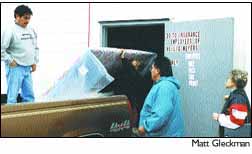March 2, 2000
By Matt Gleckman Planting a seed and hoping it grows — that’s what it is like to be a foster parent, says Juanita Beasley-Adams, a Social Services therapist in Towaoc. "Foster parents are optimistic, caring people who provide love, encouragement and consistency without knowing if it will ever pay off," Beasley-Adams said. Earlier this year, the child/family therapist signed on with the Ute Mountain Ute tribe and since that time has participated in counseling, working at the youth shelter and assisting with the foster-care/child-care program. "A foster parent might only have a kid for a short period of time and once the child is returned to their original home, they may lose contact," she said. "It is a very challenging situation to be in." Kayla Hatch, director of the home-based portion of Towaoc’s Department of Social services and the former foster-care/child-care coordinator, said the foster-parent program has been operating for many years. "In the past, if a child got into trouble, another family member would step in and take over for a while," Hatch said. The Towaoc program began officially in 1980 when the Bureau of Indian Affairs took over operations. "Today the foster-care program is coordinated by Patty Lopez of Towaoc and is working with about 15 kids in homes throughout Towaoc, Cortez, Bayfield and Durango," said Hatch. "We like our foster parents to come from a variety of backgrounds so that the kids are exposed to different things," she said. Individual programs start when children get into trouble and are taken into custody by Towaoc’s social services, Hatch said. "Families around the area who are interested in taking in a foster child receive the mandatory state and federal training and then take over responsibility for the child for a period of time," Hatch said. According to Jody Mealing, foster-care coordinator for Montezuma County, training is a thorough process. "Potential foster families are trained in infant attachment, what it is like to be a foster parent, the financial aspect of foster parenting, strategies for handling an emotional child, as well as CPR and first aid," Mealing said. "Each potential family has to read a rules and regulations book, fill out a questionnaire and receive a physical," she said. "It is a long process and we need tough people that can handle it." Foster parents can include concerned people within the community or direct relatives, according to Hatch. "A child might go to a foster home for 30 days, three months, a year or more, depending on different circumstances and evaluations," she said. While the foster family takes over almost all aspects of raising the child, including finances, some assistance is available through the tribe and the state, Hatch said. On Feb. 24, Heilig-Meyers donated a bunk bed to the foster-care/child-care program and said that they would continue to do so in the future when the opportunity arises. "It really helps us a lot when companies such as Heilig-Meyers can make donations like that to the program," said Hatch. "Choosing to become a foster home is a case of parents supporting other parents," Hatch added. "Foster parents open their mind and take in any child. In return, the children come back ready to conquer whatever is put before them." |
||
Copyright © 2000 the Cortez Journal. All rights
reserved. |
